N2 retake ronin • Icon by 瀬野未々/senomimi @ picrew • I follow from main blog nashdas.tumblr.com
Don't wanna be here? Send us removal request.
Text
How to Make Studying Japanese a Habit
The important takeaway here is rather than strict goals, you can try building healthy habits to help improve your Japanese goals.
I do this, and I didn't know there was a name for it, but this gives you tips and tricks and step-by-step to build your own healthy study habits. A good read!
176 notes
·
View notes
Text
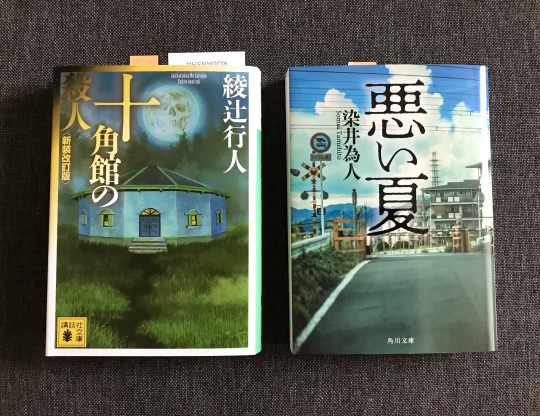
I switched from reading 悪い夏 to 十角館の殺人 .
To be fair, I didn’t finish the first chapter. The book is quite difficult at my level which means: looking up many unknown words if I want to understand what's going on. Looking up many words is much more bearable if the story really grabbed my interest. Unfortunately, that wasn’t the case for me (yet). 悪い夏 is probably interesting, the story just needs more time to unveil the intriguing parts, I guess.
Don't get me wrong, slow paced stories have absolutely their place! But since I have to patiently look up a lot of words in both of them anyway, I prefer the story that grabs my interest from the beginning. And at this point, that’s 十角館の殺人 .
I‘ll give 悪い夏 another chance in the future.
18 notes
·
View notes
Note
何か説明してもらえませんか?リブログした以下の画像はなぜ面白いなんですか?意味がちゃんと解けないせいで、少し混乱しています。答えてありがとうございます^_^

メッセージありがとう!
上にある画像はスタジオジブリの色んな映画のタイトルからとってる言葉を文章にした画像ですよ。
その文章は:
耳をすませば・となりの 墓・から 女々・し・く・て* がきこえる
上のリンクをクリックしたら、ジブリの映画の資料が見えます(*てのもとだけは見つからなかった)
文章の意味と言えば、何が面白いと言ったら、まずは「女々しくて」という曲の存在を知った方がいいです。
ゴールデンボンバーというバンドの名曲: 女々しくて
そして、よくミームみたいに、この上のスタジオジブリの映画の言葉を使って、何かの曲のタイトルを「耳をすませば墓から〇〇がきこえる」に入れるみたいです。例えば、X-Japanの「紅」という曲も同じミームを見ました。
英語だと: When I listen I hear "Memeshikute" coming from the grave next to me.
説明が分かりましたかな? (^.^)
15 notes
·
View notes
Text
Phones in Japanese
Some vocabulary for phones in Japanese.

携帯電話 けいたいでんわ mobile phone, cell phone
携帯 けいたい mobile phone, cell phone (abbreviated)
スマートフォン smartphone
スマホ smartphone (abbreviated)
電話番号 でんわばんごう phone number
シムカード・SIMカード SIM card
(携帯) メール (けいたい) メール text message (usually just メール)
通話 つうわ phone call
データプラン data plan
契約 けいやく contract
適法契約 てきほうけいやく legal contract
保証期間 ほしょうきかん warranty period
分割払い ぶんかつばらい installment payment plan
プリペイド式携帯電話 プリペイドしきけいたいでんわ prepaid mobile phone
データ量上限 データりょうじょうげん data cap
ローミング roaming
モバイルネットワーク事業者 モバイルネットワークじぎょうしゃ mobile network operator
ネットワーク受信エリア ネットワークじゅしんエリア network coverage area
サービス状況 サービスじょうきょう service status
サービス停止 サービスていし service outage
セルラーネットワーク cellular network
ワイヤレスブロードバンド wireless broadband
ワイファイ Wi-Fi (usually written as Wi-Fi)
340 notes
·
View notes
Text
TIL that ノンケ (nonke) is a colloquial word for a heterosexual person.
After all the numerous Japanese BL/QL shows that I have watched, I couldn't believe that it was the first time I encountered this word. And damn it was used so aptly in Ayaka chan wa Hiroko senpai ni koishiteru that I burst out laughing everytime she said it. I am already in love with Hiroko senpai.
Not only do we get a lesbian who is fully integrated into the LGBTQ+ community along with various styles and representation of the community but we also get a semi-masc FL who is just *chef's kiss*
27 notes
·
View notes
Text
Japanese vocab list for cinema
映画館(えいがかん)Movie theater
俳優(はいゆう)Actor/Actress
監督(かんとく)Director
シナリオ Screenplay
シナリオライター Screenwriter
撮影(さつめい)Filming/Photography
編集(へんしゅう)Editing
字幕(じまく)Subtitles
吹き替え(ふきかえ)Dubbing
ポップコーン Popcorn
チケット Ticket
映画のジャンル(えいがのジャンル)Film genre
レビュー Review
評価(ひょうか)Rating
映画祭(えいがさい)Film festival
May use these for my Japanese diary entries. I'm sure some others will get added.
I'll do film genres next I think. Categorization, my love.
If any of these doesn't sound natural or you can think of alternatives even, feel free to tell me!
61 notes
·
View notes
Photo

ネットで本を買うことが多くなって、本屋さんに出かけることがめっきり少なくなった今日この頃。でも、偶にはこうしてぶらぶらと、本屋さんを冷やかして歩くのもいいもんだね。
273 notes
·
View notes
Text
vocab from 魔女の宅急便, pt. ???

you thought you'd seen the last of this vocab series, huh??!
no, in fact i finally found the time to read a few more chapters of this book. for the uninitiated, i read the start of this book many years ago, then put it down, then read most of it last summer, then put it down again....i seriously only have like 30 pages left at this point so come hell or high water i'm going to finish it before i leave for japan! so have some more random vocab!!
nouns:
魔法瓶(まほうびん) = thermos, vacuum flask (lit. magic bottle)
お辞儀(じぎ) = bow, bowing
お行儀(ぎょうぎ) = manners
野外(やがい) = outdoors, open air
〜係(がかり) = person in charge (of ~)
芸当(げいとう) = trick, stunt, feat; daring act
悲鳴(ひめい) = shriek, scream
尻込み(しりごみ) = recoil, flinching; hesitation
ラッパ = trumpet, horn
自慢(じまん) = pride, boast
いびき = snoring, snore
寒空(さむぞら) = winter sky, wintry weather
verbs:
べそをかく = to be on the verge of tears
すがる = to cling to, hang onto; to implore, entreat
威張る(いばる) = to be arrogant, boast
こする = to scrape, rub
かかえる = to carry, hold
adjectives:
お揃い(そろい)の = matching, going together
鼻(はな)が高い(たかい) = proud
へぼい = clumsy, unskillful, bungling
相当(そうとう)な = proportionate, befitting, appropriate
気(き)まぐれな = capricious, fickle
adverbs/onomatopoeiae:
ムニャムニャ = mumbling, muttering incomprehensibly
瞬く(またたく)間(ま)に = in the blink of an eye, in a flash
もうじき = soon, shortly
はなはだ = very, greatly
そんじょそこら = anywhere, here and there
ハラハラ = being kept in suspense, feeling anxious
expressions:
よりにもよって = X of all X (e.g., today of all days, her of all people)
ヨーイドン = ready, go!
ヨイショ = heave-ho!
#japanese vocabulary#so that's how to say “of all the gin joints in the world...”#subject: literature
84 notes
·
View notes
Text
When the last persimmon falls
Or, "I tried to search in Japanese: 柿 (かき kaki; persimmon) edition"
For about a year, this post was a few lines in my drafts. An open-and-shut case, I thought. Today, struck by the mood to get it over with, I googled (and DuckDuck went), got lost, then found the truth. It didn't take long - and I won't make this post too long - but the result wasn't what I expected.

Here's the story of why if I had a nickel every time I heard a character in Japanese fiction say their life depends on the last fruit hanging onto a persimmon tree in winter, I'd have two nickels, which isn't a lot, but it's weird that it happened twice.
Spoiler: One of my nickels wasn't exactly a nickel, but I still had another one I didn't know I had. And that's the correct currency.

What:
A character is seriously ill. Meanwhile, a persimmon tree visible from their sickbed has only one fruit left. The character says they'll die by the time it falls.
Where:
Yakuza: Like a Dragon (Yakuza 7) substory Persimmon Premonition - see first image.
Gintama episode 296. Not a persimmon - see image above.
Osomatsu-san season 3, episode 20, part C. I watched this but forgot about it until now - see image below.
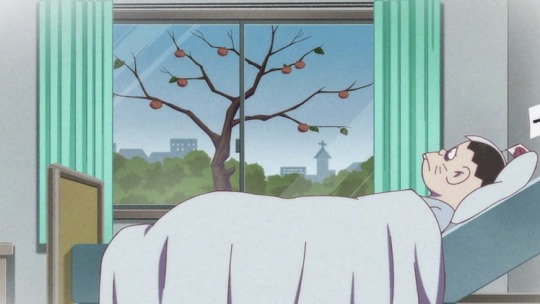
The question
This Yakuza 7 substory reminds me of that Gintama episode. They must both be referencing some other thing. What is it?
Trees and fruits and seasons are some classic poetic shit TM, maybe it's a literary reference? The image of the last fruit on the tree is one of those set phrases in formal correspondence that reference changing seasons? A ripe persimmon falling to the coldness of winter symbolises death?
The search
persimmon japanese winter
"Kigo (季語) is a Japanese word or phrase associated with a particular season; especially in poetry. And "persimmon" (柿) is one of the famous kigo for autumn." The taste of persimmon features in a famous haiku about the Horyuji temple bells in Nara. (source 1) At the time this haiku was written, only the astringent persimmon variety was cultivated in Japan. It falls off the tree easily. (source 2)
Okay, but still too general.
柿の実 (persimmon fruit) 冬 (winter) 落ち (drop) 死ぬ (die)
Gardening tips. Many gardening tips.
最後の柿の実 (The Last Persimmon Fruit) 話 (story) 伝説 (legend)
Did you know that traditionally, a few persimmons are left behind on trees in harvest season? They're called 木守り (きまもり kimamori), and were originally meant for travellers, birds, and other animals to eat, because it's hard to find food in winter. In Nagano, souls of the deceased are said to come down to persimmon trees. (sources: 1, 2, 3)
Getting warmer...?
患者 (patient) 柿の実 (persimmon fruit) 冬 (winter) 死ぬ (die)
dic.pixiv.net link: Persimmon (Osomatsu-san)
Name of Osomatsu-kun chapter
Osomatsu-kun strip (via Twitter): One last persimmon, da jo~
The end
As the last link explains, the same trope appeared in Osomatsu-san and Osomatsu-kun (manga only). They were both inspired by...
The Last Leaf by O. Henry.
A story that, having read the Wikipedia article, I vaguely remember from English class or something. Just like everyone who made the latter-half-of-20th-century stuff in the "Adaptations" section.
Now what?
"Where did the basic premise come from?" is solved, but not why all the examples here used persimmons.
Maybe a lone, orange kimamori representing autumn and hanging on in spite of winter is more evocative than a dull leaf.
More likely, that image inspired the Osomatsu-kun strip, then Yakuza 7 and Gintama took the whole setup from Osomatsu-kun, persimmon (or Sacchan) included. Not where I thought it would come from, since I inconveniently forgot the Osomatsu-san episode.
But, this is all only as far as I took the research. If anyone knows more about this persistent trope, I'd love to hear it!
31 notes
·
View notes
Text
My drafts are horribly unmanageable, so here are some images that I apparently was never going to post but also cannot bear to delete:

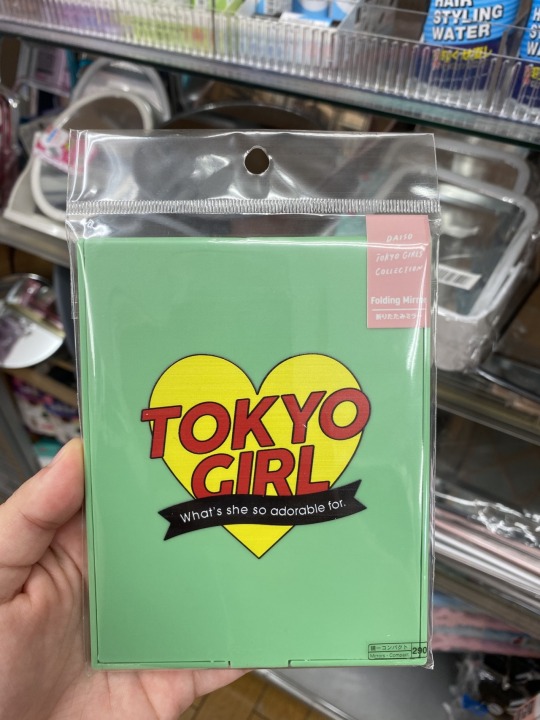
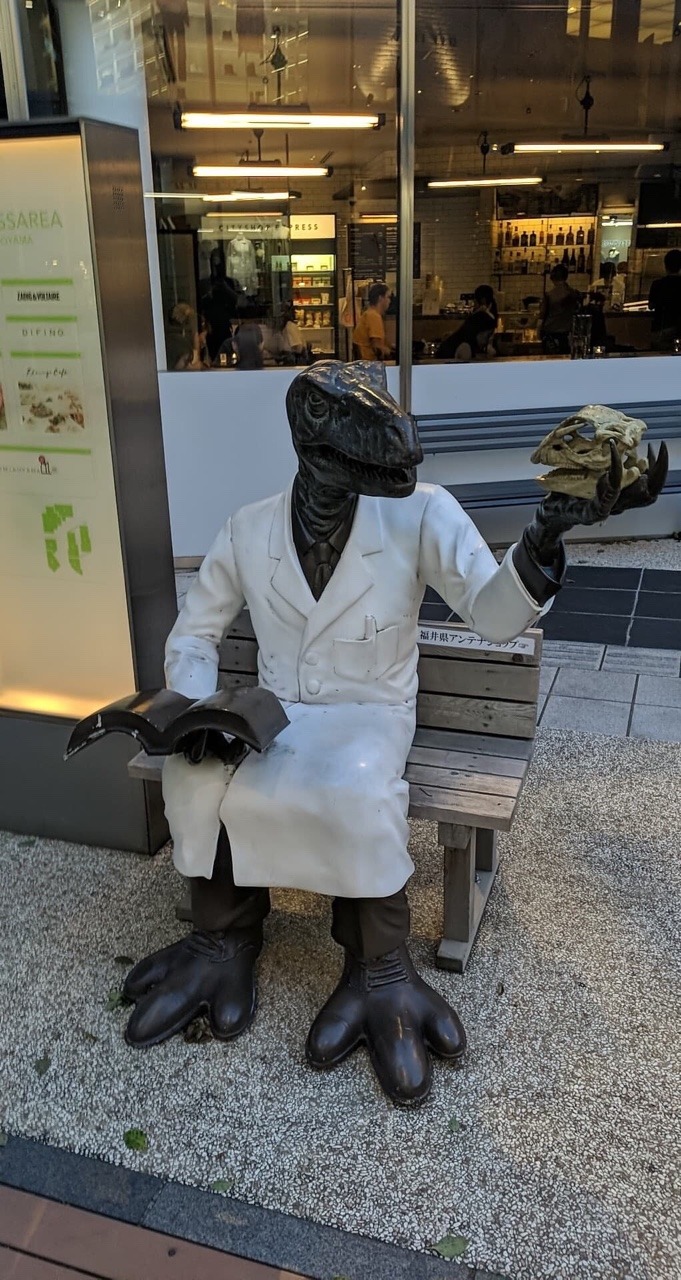
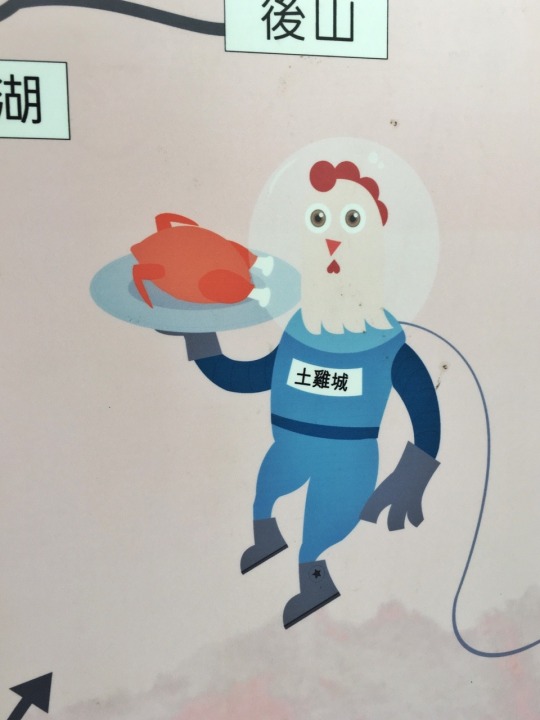

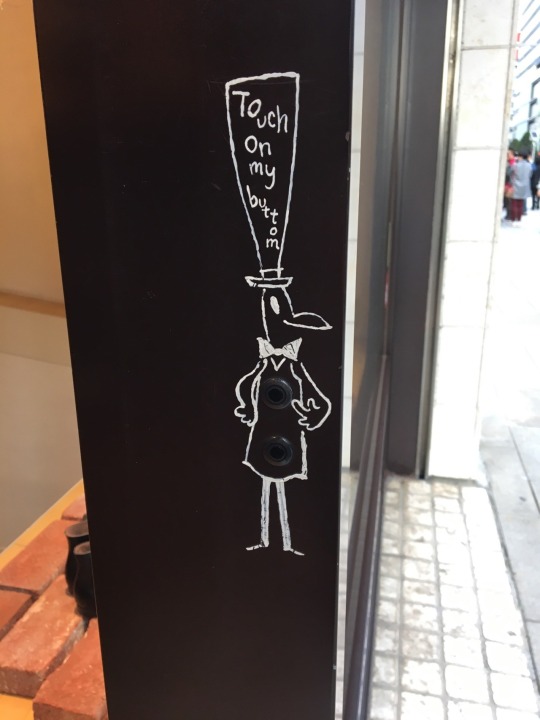


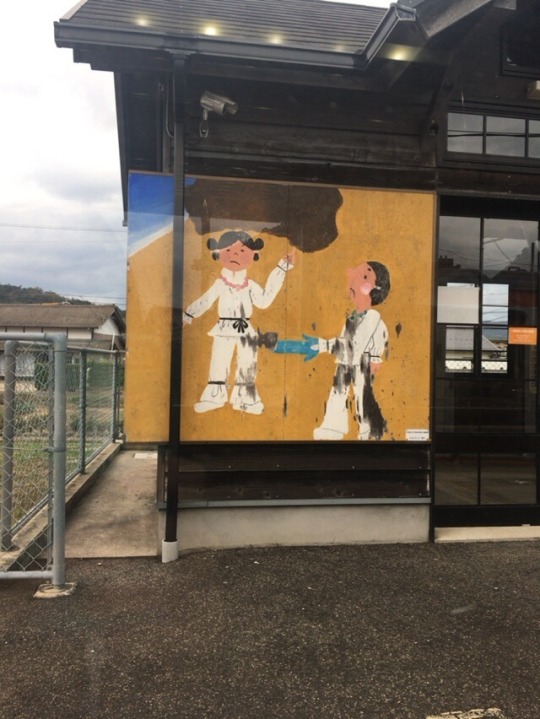

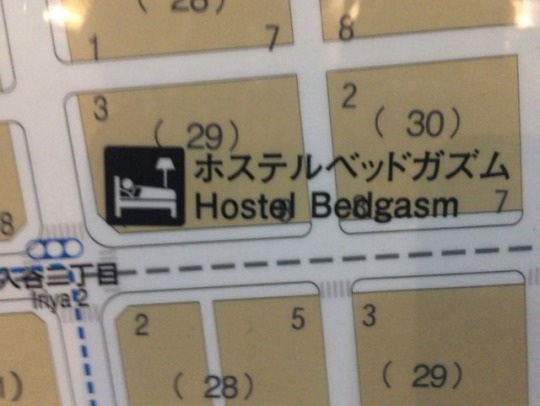

146 notes
·
View notes
Text
In Japanese, when you're forced to rush, you don't say "have a fire lit under my ass"
You say 「尻に火がつく」 (shiri ni hi ga tsuku; literal: fire lit on my ass)
And I think that's beautiful
2 notes
·
View notes
Text
Directory
My tags
subject: internet, subject: communication, subject: signage, subject: kanji, subject: comedy, subject: food, subject: translation, subject: idioms, subject: colloquial vocab, subject: film and TV, subject: literature
General tags
dictionaries, japanese langblr, japanese grammar, japanese vocabulary, places in japan My posts (after the cut)
The Mystery of the Last Persimmon
tbc
0 notes
Text
japanese learners/japanese speakers, is there any solid dictionary that i can use to look up words? like larousse for french, is there any websites/dictionaries for japanese?
533 notes
·
View notes
Text
weird question,but does anyone have any advice on how to think of things to talk about when you're trying to learn a new language? I'm trying to get better at Japanese by posting on HelloTalk everyday, but I've fallen behind because I just can't think of anything to post about? I'm pretty boring lol Does anyone else have this problem??
539 notes
·
View notes
Text
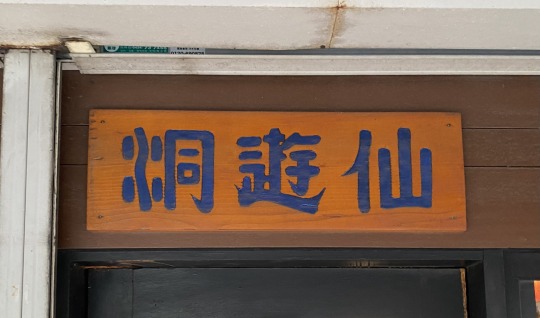
This sign at an antiques store threw me off because I kept reading it backwards! Sometimes you encounter Japanese text that's written right to left, either to create a "ye olde" effect (e.g. Bonyaji Kunraf) or because it's actually old. It was actually the standard way to write until around WWII.
Anyway, this says 仙遊洞, read either Sen'yūdō or Sen'yudō. And we've actually covered most of these characters before! It's just hard to tell with the seal script. For example, it took me absolutely ages to decode 遊, because the combination of ⻌ and 方 looked to me like 言 and 走 and I could not for the life of me believe it was anything else.
仙 is read セン or セント, as in ateji for cent. Though you see it mostly in place names today, it can also mean wizard or hermit. The radicals are 亻 man and 山 mountain so that makes sense!
遊 is read あそ.ぶ, あそ.ばす, ユウ, or ユ. It means to play or enjoy. Adults also use 遊ぶ to mean hanging out together, having fun together, or hooking up.
洞 is read ほら or ドウ. It means den, cave, or excavation. It's so interesting to see how the water radical 氵is written in seal script!
57 notes
·
View notes
Text
Comedy web shorts
Kinari Movie (キナリムービー) on Instagram and Tiktok is a fun source for quick beginner/intermediate level Japanese listening practice. They're also on Youtube, but new videos get posted on IG and Tiktok first.
Their sketches tend to be stand-alone and about everyday life in Japan, so they don't need prior knowledge of running jokes or specific pop cultural references to understand.
Here's one they posted today about a man in urgent need to use the toilet who tries his luck at a cafe: トイレだけ借りる客
A similar studio/channel is Coneco Film (こねこフィルム), but they have more multi-part sketches.
#japanese studyblr#jlpt n4#jlpt n3#japanese vocabulary#japanese langblr#subject: internet#subject: comedy
0 notes
